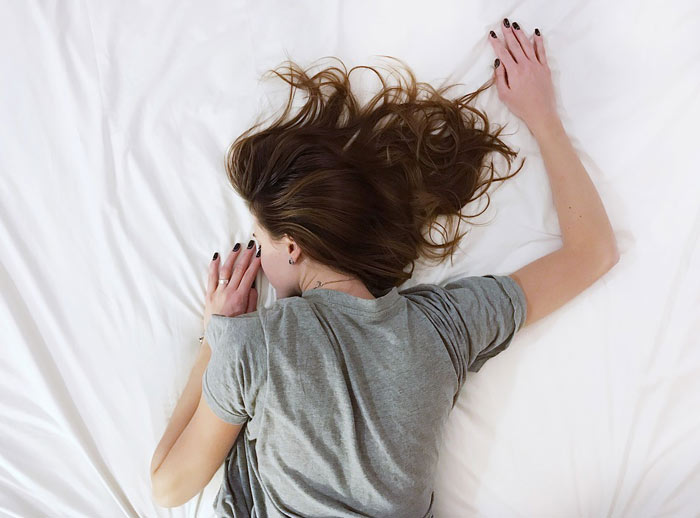Everyone knows adults require between 7 to 9 hours of sleep each night. However, whether we’re managing to get that much-needed shut-eye is another question altogether. Between staying up late working, unwinding from the day in all the wrongs ways and spending too much time tossing and turning, we can end up running off broken, insufficient sleep that leaves us walking around like zombies. But you can crack your sleeping pattern by following these tips and wake up feeling refreshed and ready to go.

No Screens Before Bed
It’s difficult not to check your phone when it lights up with a new notification or turn on the TV as a way to relax. But screens before bed are proven to be bad for helping you drift off to sleep. The blue light emitted from screens effects the production of melatonin, the hormone you produce that controls when you feel sleepy and when you’re ready to wake up. This includes TVs, tablets, laptops, and phones. By using screens, you’re also waking up your brain. Not looking at a screen for at least half an hour before turning in for the night means you can benefit from a better start to your night’s sleep. Also, ensure you’ve put your phone on Do Not Disturb so that you won’t be woken by any other incoming messages or emails.
Relax Before Bed
 Doing activities that disconnect you and your mind from the day prepares you for going to bed. Find ways that completely relax you like drawing a bath. Lowering the lights a few hours before bed also associates your body with day and night, so adding a candle or two whilst you soak in the bath is not only a nice treat but also a way to tell your brain its time to shut off. Sleep masks are also great for shutting out light and making your body feel like it’s night-time even if the sun is still out. Reading a book right before tucking yourself in is another way to take your mind away from any day to day stressors and, no matter how good the book, your eyes will likely start drooping. If reading, it’s important to avoid reading a book off any backlit devices.
Doing activities that disconnect you and your mind from the day prepares you for going to bed. Find ways that completely relax you like drawing a bath. Lowering the lights a few hours before bed also associates your body with day and night, so adding a candle or two whilst you soak in the bath is not only a nice treat but also a way to tell your brain its time to shut off. Sleep masks are also great for shutting out light and making your body feel like it’s night-time even if the sun is still out. Reading a book right before tucking yourself in is another way to take your mind away from any day to day stressors and, no matter how good the book, your eyes will likely start drooping. If reading, it’s important to avoid reading a book off any backlit devices.
Preparation for Bed
From your bedding to what you wear, it’s important to ensure your set up is comfortable. Your pillow should be neither too plump or too flat, supporting the natural curve of your neck to avoid an uncomfortable crick. Suffer from back pain? Putting a pillow between your legs aligns your hips and can be a great support. Much like your duvets, your pyjamas should provide the same qualities maintaining a good body temperature. Buy different pyjama styles for different times of the year. No need to spend a fortune on multiple pairs of pyjamas though. Use sites like My Favourite Voucher Codes, where you can find the latest money off codes at places like Dorothy Perkins and New Look. Silk is great for all-year-round wear with temperature regulating qualities. However, for those not keen on the texture, flannel will keep you warm in the colder months, whilst cotton is lightweight and breathable for warmer times of the year.
Exercise in the Day
 Getting in a workout every day is not only important for the overall health of your body, but it also gears you up ready to go to sleep at night having used up lots of energy. However, scheduling a workout too close to bedtime can be a rookie mistake. You should ensure any exercise you do is complete at least 3 to 4 hours before you plan to hit the hay, as high intensity exercise can give you a new boost of energy that stops your brain and body shutting off. That said, low impact exercise like Yoga and stretching can be a great way to bring a sense of calm to your body and promote a good night’s sleep.
Getting in a workout every day is not only important for the overall health of your body, but it also gears you up ready to go to sleep at night having used up lots of energy. However, scheduling a workout too close to bedtime can be a rookie mistake. You should ensure any exercise you do is complete at least 3 to 4 hours before you plan to hit the hay, as high intensity exercise can give you a new boost of energy that stops your brain and body shutting off. That said, low impact exercise like Yoga and stretching can be a great way to bring a sense of calm to your body and promote a good night’s sleep.
The Don’ts of Eating and Drinking
Food and drink can have a big effect on your quality of sleep. Drinking too close to going to sleep can mean you end up having to make a midnight trip to the bathroom. Avoid having anything further to drink 2 hours before you go to bed. You should also avoid too much caffeine in the afternoon, whether that’s in your coffee or elsewhere found in different foods and drinks. Alcohol also tends to give you a restless sleep. Whilst it may initially make you feel dozy and send you off to sleep, this will wear off and you’ll find yourself wide awake, likely with a dry mouth. Any late-night snacking should be limited to light foods, otherwise your digestive system will be working overtime and eating at night can cause weight gain. High fiber cereal and nuts are a great way to feel full not eating much. Fruit, as well as crackers and meat or cheese also work as a light snack, the recommended calorie count being around 200 for a late night snack.
Other Sleeping Tips
You should never work from your bed. All bedroom activities should be associated with relaxing, not the latest work spreadsheet. Implementing a schedule of when you go to bed and when you wake up will help set up your body clock and have you naturally waking a lot easier and falling asleep quickly, boosting your quality of sleep. Even on weekends, you should ensure you don’t sleep in to maintain your body’s schedule. If you fancy a siesta, limit it to 20 minutes and ensure it’s not too close to bedtime. If you end up going to bed late, you should still wake at your normal time and catch up on shut-eye with a nap in the daytime. In the case that you really struggle to get to sleep, magnesium is proven to help with insomnia by relaxing your muscles and making you feel drowsy.
Timing is everything when it comes to getting a good night’s sleep. From how much you’re getting to the time between going to bed and when you last ate. By following these tips, you could quite literally improve your quality of sleep overnight.










